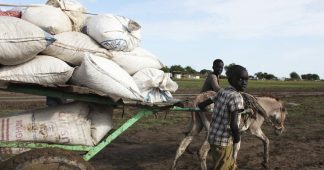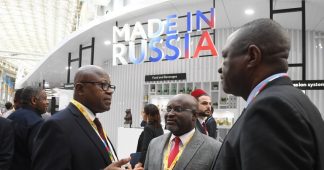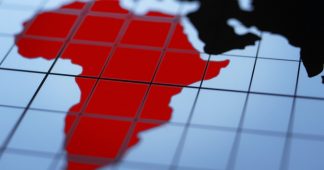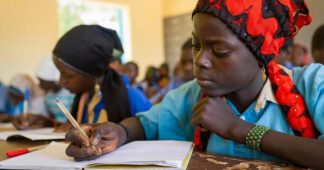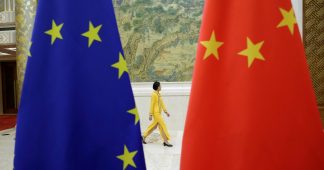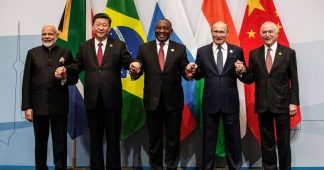In Kigali, Rwanda, on March 21, 2018, five years after the 50th anniversary of the creation of the Organisation of African Unity (OAU)/African Union (AU) – considered in the Newspeak of the AU as “fifty years of success” – 44 of the AU’s 55 member states signed the Agreement concerning the Creation of the African Continental Free Trade Area (AfCFTA), a “single continental market for goods and services, with free movement of business persons and investments”. Suppression of customs tariffs is supposed to boost intra-African trade, which represents around 12%-15% of Africa’s exchanges, well below the internal exchanges of other continents (which makes Africa the most open region to world trade). In the event of ratification, by 22 of the signatory states, by late 2018 – early 2019 – intra-African trade is slated to exceed 50% by 2022.
It is a major stage in the process of African integration, which should culminate in the African Economic Community (AEC), the objective of the AU programme for the following half century, entitled “Agenda 2063: The Africa We Want” or “an integrated, prosperous and peaceful Africa, driven by its own citizens and representing a dynamic force in the international arena.” [1] This project is based on a supposed (capitalist) economic dynamism of Africa, expressed by the average rate of growth of its GDP, which since the first decade of the 21st century, has been above the world average, making Africa the second locomotive region, after Asia, of world growth. [2] Thus, some African and indeed non-African voices, consider this as Africa’s century. An Afro-optimism which seems in correlation with a renaissance or renewal of Pan-Africanist discourse outside the AU, among the African intelligentsia and employers.
For the boosters of this supposed African economic dynamism, there would be no incompatibility between the Pan-Africanist ideal of the emancipation of the African peoples and the rooting of the supposed African economic dynamic in the neoliberalisation of capitalist globalisation. Yet the train of African integration risks ending up at a terminus other than that of the emancipation of the African peoples.
The OAU and the African Economic Community project
The idea of a single African market, an African Economic Community, is not a novelty. It is linked to that of Pan-Africanism as officially discussed immediately after the massive emergence of newly “independent” African states in the early 1960s. Thus, on the eve of the creation of the OAU, one of the main protagonists in the debate, Ghana’s president Kwame Nkrumah, stressed the economic dimension of the gestating African unity or union, but abstracting from this the question of social classes and their antagonistic interests, resting on the principle of the “African personality” as well as the Bandung spirt to win his fellow heads of state – most of them comfortably installed in the networks of neo-colonialism – to the project of a unity and economic solidarity of African states, in the interests of the African peoples.
It was, in his view, a condition for the conservation of political independence, recently acquired by the great majority of African states, and for the decolonisation of the entities remaining under the colonial yoke. “An African Common Market, devoted uniquely to African interests, would more efficaciously promote the true requirements of the African states. Such an African Market presupposes a common policy for overseas trade as well as for inter-African trade and must preserve our right to trade freely anywhere” he argued. [3] Furthermore, “the pooled sum of our present individual investments in our similar national projects, if used within an integrated plan, would give greater benefit in mutual development. Indeed, the total integration of the African economy on a continental scale is the only way in which the African states can achieve anything like the levels of the industrialized countries.” This economic union, Nkrumah reiterated some time afterwards to his peers meeting in Addis-Ababa for the birth of the OAU, should involve a single African currency, an African central bank, and so on, which would require an African confederal political structure.
But this did not take into account the indefatigable attachment of virtually all the African heads of state to a Balkanised independence – often masked by the evocation of a very vague gradualism – the intangibility of the borders inherited from colonisation being erected at this occasion into a principle. [4] This was to underestimate their preference to “return to the fold of the former colonial rulers” (Nkrumah, speech during the creation of the OAU) under the form of institutions of “cooperation” set up with the colonial metropolis during decolonisation for neo-colonial domination.
Thus, although the idea of the African common market had seemed shared beyond the handful of states then deemed progressive, the signatories to an OAU Charter intended “to coordinate and intensify their cooperation and efforts to achieve a better life for the peoples of Africa” only stated that “the Member States shall coordinate and harmonize their general policies, especially in the following fields: (a) Political and diplomatic cooperation; (b) Economic cooperation, including transport and communications”. The unity finally obtained by the supposed “founding fathers” of Pan-Africanism was reduced essentially to coordination and consultation. In fact, despite the subsequent existence of certain sub-regional institutions (Central African Customs and Economic Union, East African Community), the creation of the OAU had mainly consecrated the construction of African nation states, dependent in general on central capitalism or neo-colonial/neocolonised.
From the Lagos Plan to the AfCFTA
A decade later, in the 1970s, confronted with the persistence of under-development, or the “development of under-development”, these African states, after having vainly participated with the countries of Latin America and Asia (around forty of them constituting the ACP countries which had drawn up the so called Lomé I Convention with the EEC in 1975, an extension of the Euro-African Yaoundé II Convention), pleading at the UN from 1973 to 1976 in favour of a New International Economic Order, returned to the Pan-Africanist project. The formulation of this was the Lagos Plan of Action for the Economic Development of Africa, 1980–2000, adopted by the second extraordinary session of the OAU Conference of Heads of State and Government (Lagos, April 28-29, 1980).
The latter, having noted the failure of global development strategies and the inability of African states to “point to any significant growth rate or satisfactory index of general well-being, in the past 20 years”, as well as the exploitation of Africa by “neo-colonialist external forces which seek to influence the economic policies and directions of African States”, committed itself “to promote the economic integration of the African region in order to facilitate and reinforce social and economic intercourse”, leading to “the eventual establishment of an African Common Market leading to an African Economic Community”. [5]
But this sort of return to the idea rejected at the birth of the OAU did not come at any propitious moment. The failure of “development” correctly identified overlooks the share of responsibility borne by those who managed the African states (mismanagement as a factor in the primitive accumulation of private capital and so on), leading nearly all the over-indebted African states, from the 1980s onwards, into reliance on the Bretton Woods institutions, advocates of neoliberal structural adjustment programmes and the “Washington consensus”. [6] In fact, this amounted to a reorganisation of the dependency of the African states/economies in respect to the traditional capitalist powers, in the context of a neoliberal restructuring of capitalist globalisation, accentuated in the following decade by the end of the so-called Communist bloc. An updating of dependency rather than “self-dependence”, integration in the neoliberal phase of globalisation rather than the creation of an African Economic Community (of a capitalist nature, certainly). All this leading to a stronger grip by the transnationals, principally of Western origin, on the African economy, through the dispossession of the strategic enterprises of the states. A minority of native capitalists also profited from this, often linked to or constituted by the leaders of the African states. For the popular classes, including the lower layers of the middle classes, there was pauperisation.
The Lagos Plan was replaced in June 1991 by the Treaty Establishing the African Economic Community, signed in Abuja (then the new Nigerian capital) by 51 OAU states. The so-called Abuja Treaty still referred to the Lagos Plan, and the integration of African economies, while seeing “state commercial companies” as actors in intra-African exchanges. It established a schedule of transition to the said Community, over a maximum 34 years (anticipated for 2025) and divided into six stages. A maximum of 10 years was set for free trade zones in regional economic communities in southern, central, eastern, northern and western Africa.
However, although accepting the capitalist paradigm, for the states and the OAU technocracy, this did not represent a pure and simple alignment about neoliberal capitalist globalisation and the restructuring of imperialist domination. For example, the UN Economic Commission for Africa had, in an evaluation of the implementation of this treaty, noted this contradiction concerning the fixing of a rate of participation of national capital (from 30 to 51% according to the regional community) for all industrial enterprises in certain regional communities: “It is not possible to want to attract massive foreign investment and, at the same time, establish a sub-regional market virtually closed to foreign investors. Obviously, on this issue, most of the sub regional communities have not adapted to the neo-liberal economic spaces emerging in African States.” [7] This showed a certain desire to limit, in the name of a supposed nationalism or Pan-Africanism, the grip of the transnationals on Africa’s economies, thus favouring the development of African capital or African fractions of the capitalist class, the national bourgeoisies – to which the political leaders and those around them belonged, without really addressing the aggravation of poverty among the popular classes in the 1980s and 1990s.
The Lagos Plan and the Abuja Treaty were, in the 1990s, the main reference points for an African economic nationalism superficially denouncing the neo-colonialism of neoliberal structural adjustment. Ten years after the adoption of the Abuja Treaty, as the OAU became the AU (2000-2002), the organisation publicly assumed a neoliberal orientation, adopting, in 2001, the New Partnership for Africa’s Development (NEPAD) – drawn up under the auspices of the presidents of Senegal (Abdoulaye Wade), South Africa (Thabo Mbeki), Algeria (Abdel Aziz Bouteflika) and Nigeria (Olusegun Obasanjo). A development programme allegedly “by Africans and for Africans”, but criticised by the Nigerian activist Moussa Tchangari as “firmly mired in neoliberal dogma” because of its compliance with the spirt of the Bretton Woods institutions.
NEPAD and the Abuja Treaty formed the basis of the AU’s new Pan-Africanist project, “Agenda 2063: The Africa We Want” of which the entry into force of the AfCFTA is a decisive stage. It is in the dynamic of assumption of this neoliberal option of Pan-Africanism that we should see the enthusiasm expressed by Nigeria’s Mahamadou Issoufou (responsible for the coordination of the process of negotiation of the agreement), Rwanda’s Paul Kagame (president of the AU when the agreement was submitted for signature – the Rwandan Patriotic Front, led by Kagame, is the proprietor of the holding Crystal Ventures Ltd,, the biggest private employer in the country, with investments around the world ), the technocrats of the AU and nearly all the Pan-African media.
The AfCFTA is an African version of the regional free trade agreements which have become fashionable, whether already signed or under negotiation. This “expanded and secure market for the goods and services of State Parties through adequate infrastructure and the reduction or progressive elimination of tariffs and elimination of non-tariff barriers to trade and investment” (Preamble to the Agreement), has as its reference point (with the Constitutive Act of the AU and the Abuja Treaty) the Marrakesh Agreement which created the World Trade Organisation (WTO). Thus, it promises, generally, the same effects as free trade processes elsewhere.
A minority of winners and many losers
As the Ugandan activist Yash Tandon has put it, in the context of free trade, “trade is war”. A war where the winners are generally the same: the capitalist economies which are already the most dynamic and who are often initiators of the current wave of free trade agreements. Thus, the United Nations Conference on Trade and Development has drawn attention to the continued erosion of the margin of action of developing countries produced by regional and bilateral trade agreements, above all in the “less developed countries”, with Africa accounting for 33 of the 47 countries thus classified around the world.
However, even inside the economies considered as the most dynamic, there are winners and losers from free trade. As the partner states are supposed to negotiate on the basis of the competitive advantages of their respective economies, the agreements also reflect the inequalities between sectors inside the national economies as regards international competitiveness. So, some local economic sectors are sacrificed, generally to the benefit of the transnationals of local origin, as are the popular classes.
Thus, the growth of free trade increases the (re)production and aggravation of inequalities and pauperisation. This does not prevent these agreements adopting formulas to the contrary. For some year, women, youth and extreme poverty have been at the centre of a supposed attention to social justice on the part of these international institutions. [8]. An apparent concern for social justice that some have called “social-neoliberalism”, expression of a “neoliberal heterodoxy”. In the text of the AfCFTA, the promise is to “promote and attain sustainable and inclusive socio-economic development, gender equality”, and the Protocol on services promises to improve the social and economic wellbeing of the whole of the African people.
An authentic desire for inclusion is not apparent in the opacity which characterises the drawing up and negotiation of these free trade agreements, excluding civil society, social movements, and indeed parliaments, including in states which claim a long tradition of representative democracy. Which can be considered as a semi-admission of the undemocratic objectives of the drafts under negotiation. Whereas Agenda 2063 undertakes to put «mobilization of the people and their ownership of continental programmes at the core – according to the African branch of the Third World Network “There is little space in the structures involved with the CFTA for participation by civil society groups or the private sector. The only possibilities so far seem to be episodic consultations with these groups outside any of the negotiating structures.” [9] In vain, a Pan-African network of organisations of civil society has requested “that a space is created at the national, regional and continental level for African citizens and socio-economic groups like workers, farmers, producers, enterprises, civil society, the private sector and so on, for an effective participation in a democratic and transparent process… that all information linked to the CFTA and the process of negotiation and implementation are available in a timely fashion so that all citizens can make their contributions at the national, regional and continental level”. [10] For in the absence of a democratic process, one of the minimal conditions for “democracy” is the availability to citizens of information on the said project to allow debate, prior to a referendum consultation.
But the attitude taken to the negotiation of the CFTA is only logical with respect to the contempt for even minimal democracy shown by many states of the AU; the institutions of the latter being generally led by former actors and members of the clientele of these states, bearers of a political culture hostile to democracy. Thus, in Senegal, often presented as one of the emblems of democracy in Africa, “The overwhelming majority, 99.999% of the population is not aware of the issues around the CFTA. Even the intellectuals are not aware”, says economist Ndongo Samba Sylla. [11]
We publish here the second of the three parts of this analysis devoted to the ACFTA. It will discuss its contradictions, the reservations expressed in Nigeria and how the ACFTA would be synonymous with social dumping.
On March 21, 2018, five years after celebrating the half-century of existence of the Organization of African Unity (OAU)/African Union (AU) – considered in the AU Newspeak as “fifty years of success” , 44 of the 55 AU member states signed in Kigali the Agreement Establishing the African Continental Free Trade Area (ACFTA) – the creation of a “single market for goods and services facilitated by the movement of persons […], a liberalized market for goods and services” according to the text of the Agreement. [12]
Enthusiasm, lack of “pillars” and transnationals
The media enthusiasm that followed the signature in March 2018 in Kigali of the ACFTA Agreement by 44 AU states (followed by five other signatures at a summit in July) was preceded by a few criticisms. Admittedly, they were quite isolated in a political, media and intellectual environment where, perhaps more than elsewhere, the hegemony of the capitalist or even neoliberal economic discourse manifests itself. It is enough to make a search on the internet for “continental free trade zone”, or to read the pan-African economic press, whose pro-capitalism is pretty obvious.
So, a demonstration was made, by these few critics, that if this agreement comes into force, it is likely, because of the peculiarities of the insertion of Africa into the world capitalist civilization, to be among the worst of the free-trade wave that is underway. Certainly, a good (capitalist) free-trade agreement, that is to say one that is profitable for the working classes, is impossible.
Despite the postponement by a few months, compared to the deadline of the end of 2017, we could see the haste with which the text of the agreement was developed, negotiated, and submitted for signature. This is partly explicable by a certain mimicry, and considering the result, it deserves, without exaggeration, to be described as an “error” [13], and as “madness” [14]. The inconsistencies that had already been noted by some civil society organizations, who were, however, supportive of the process, were not corrected [15]. This is illustrated, for example, by the fact of mentioning in the Preamble that”the Free Trade Areas of the Regional Economic Communities (RECs) pave the way for the creation of the African Continental Free Trade Area,” whereas the supposed pillars are non-existent: none of the RECs can already be considered to be a free trade area. The opinion very widely shared by specialists is that the East African Community (Burundi, Kenya, Uganda, Rwanda, Tanzania) is the most advanced process, due to having introduced the free movement of goods and a common external tariff. But this REC is still only at the beginning of the process of building a regional common market. There is also the Tripartite Free Trade Area process bringing together three RECs (the Common Market for East and Southern Africa – COMESA, – the East African Community – EAC – and the Southern Africa Development Community – SADC), representing 27 African states, from the Indian Ocean to the southern shores of the Mediterranean Sea. Signed by 22 states in 2015, initially expected to come into force in 2017, this agreement was only ratified in August 2018 by 3 of the 14 states required. With the exception of Botswana, Eritrea, Tanzania and Zambia, however, all of them have signed up to the ACFTA. It is as if, instead of serving as pillars of the Tripartite Free Trade Area, the RECs plan to use it as a pillar if it is implemented. So, it is as if it was up to the roof to serve as a support … for the pillars. This points to an inability for states to go beyond the stage of signing the agreement.
So, let us remember that the reason there are no regional FTAs is because there are not, properly speaking, many dynamic and diversified economies – from the point of view of capitalist development – producing goods to move freely from Port Louis to Tunis. Indeed, the growth of average GDP recorded during the decade was drawn mainly by raw materials for export, to be processed outside Africa. This is also illustrated by the 12 to 15 per cent of intra-African trade [16].
In other words, from the capitalist point of view shared by all African states, national economies producing a diversity of goods would have favoured the existence of regional FTAs within which, thanks to “a significant redistribution policy” (J. Berthelot), the imbalances and the inequalities would have been mitigated. For example, between South Africa – which represents 61 per cent of the GDP of the 15 members of SADC – and its community partners such as Botswana (2 per cent of GDP) or Namibia (1.8 per cent of GDP), not to mention the so-called Least Developed Countries (LDCs) such as Lesotho (with 52.8 per cent of the population living in extreme poverty) and Malawi (with 59 per cent); between Nigeria with 75 per cent of the GDP of the 15 members of ECOWAS, in which the GDP of Côte d’Ivoire is 6 per cent (with 22 per cent of the population living in extreme poverty), at least ten times more than the GDP of Cape Verde (20 per cent of the population living in extreme poverty), Guinea-Bissau (58 per cent of the population) and the Gambia (12 per cent), LDCs which bring up the rear of the (capitalist economic) platoon of this REC.
A policy of solidarity that already demands the elimination of borders within the RECs, reducing the already meagre inter-African customs revenue of these states, can only get worse with the possible leapfrog that would be the rapid extension of this elimination to the whole of Africa. Especially for the LDC states, of which Africa has the largest quota in the world. Regions Refocus and Third World Network Africa estimated in 2016 that “for example, tariff liberalization between the neighbouring countries of Nigeria and Niger would be more beneficial to Nigeria (the largest economy in Africa) than to Niger, which has low relative productive capacity and limited infrastructure, etc.” [17].
However, nothing is planned similar to what has been achieved, in the way of “solidarity”, by the European Union, which the African Union takes as a model (without actually having either its sense of organization or therefore, its means): “more than a third (of the EU budget) was devoted to the Structural Funds and the Cohesion Fund, which greatly facilitated the catching up of less-developed Member States of the EU of 15, and even more so the 13 new Member States from Eastern Europe since 2004”. This is one of the explanatory factors, according to J. Berthelot, for intra-European trade representing “two-thirds of its total trade” – without however, the disappearance of the inequalities between the economies of the EU, reflected at the level of the social classes. [18].In recent years the trend has even been towards increasing inequalities and poverty in the European Union. [19].
Moreover, with such free movement of goods, transnationals of extra-African origin – some of which are already active in Africa and dominate the so-called African economy – would have greater opportunities. Rather than exporting goods produced in Europe to Africa. for example, which would be subject to tariffs, they are able to install themselves in African countries, to produce for the African market within the framework of the 90 per cent of products to be liberalized first, gradually – the remaining 10 per cent, including so-called sensitive products, will be dealt with later. The ACFTA, by organizing the sacrosanct competitiveness of African economies, is supposed to attract more (extra-African) foreign direct investment – in decline between 2014 and 2016. This explains the reluctance of some states, whose leaders have no anti-capitalist fibre, to sign the said agreement. Especially since the Protocol on Rules of Origin, setting out the criteria by which goods will be considered as originating in the ACFTA, has not yet been established.
“Betrayal” by Nigeria and socio-economic “nationalism”
This is the case of Nigeria, almost accused of felony, both by its own citizens and by foreigners. For example, the Nigeria Trade Experts Forum recalled that not only does the ACFTA originate from the Action Plan of Lagos and the Abuja Treaty, but also that Nigeria, Africa’s leading economy, had taken the chairmanship of the Continental Free Trade Area Negotiation Forum [20]. For his part, an African (non-Nigerian) teacher at Sciences Po (Paris) spoke about the Nigerian head of state, Muhammadu Buhari , in terms of a “pathetic big brother”, of the “(economic) giant of Africa and its shadowy president (who) do not seem ready to assert themselves, under the fallacious pretext of giving themselves time for reflection and continuing consultations, internally, with the business community” [21], Ethiopia and Rwanda [22] have already established themselves as hubs for transnational companies of foreign origin (European or Asian) who are interested in the supposedly promising African market. Whereas, despite the success of some of its entrepreneurs, in the first economy of Africa in terms of GDP, the manufacturing sector has been weakened by oil extractivism :”There are three leading economies in Africa, namely Nigeria, which is worth some $406 billion, Egypt, $332.3 billion and South Africa, $294.1billion. However, in terms of manufacturing value, South Africa, at 25 per cent, is the highest, followed by Egypt at 20 per cent and Nigeria with less than 5 per cent. Ghana is even more industrialized, at 6 percent manufacturing value added (MVA) [23]”.
This part of Nigerian capital is haunted by an intensification of bankruptcies that could result from being faced with competition. The industrialization by national private capital that it dreams of may not be realized. It is not convinced by the promise of “integration into value chains” – regional, continental, global – made to African and, in this case, Nigerian small and medium-sized enterprises by the technocracy of the AU, the ECA and UNCTAD – relayed by the Nigerian Minister of Industry, Trade and Investment before the publication of the volte-face of his head of state – and the club of African transnationals, “AfroChampions”. The presidency of this club, by the Nigerian Aliko Dangoté (with as co-chair the neoliberal herald of the African Renaissance, the former South African president Thabo Mbeki), an obvious ACFTA activist, expresses the existence of a divergence of interests within Nigerian and even African capitalism. Divergence and competition is also the norm within national capitalisms. Just as the Africanity of these transnationals does not imply another morality, at the national level as well as the continental level, and even in the rest of the world for the “African Globalizers”, than the normally cynical one of transnationals from elsewhere.
The fear expressed by the MAN, NANTS and others is, logically, shared by labour unions, as the Nigerian Labour Congress also asked the Nigerian head of state not to sign the ACFTA. The non-competitiveness of small and medium-sized Nigerian companies vis-a-vis the transnational companies will inevitably be a factor of bankruptcy of these companies, therefore of job losses and the growth of unemployment. This, in turn, will further flexibilise the Nigerian labour market. Already, according to the president of the NLC: “45 per cent of the workforce in Nigeria operates as casual workers. Fifty per cent of the burden of casualization exists in the downstream oil and gas and banking sub-sectors of the economy and some other workplaces. Casual workers in our workforce operate under very precarious conditions with near total denial of the benefits associated with permanent and decent work”. Since free trade or neoliberalism is not intended to reduce the exploitation of the labour force, and since a large part of Nigerian employers do not allow unions to be present in their companies, the risk is greater that there will be more poor workers in this country, where already the number of people living in extreme poverty (86.9 million out of a population of about 197 million) has become higher than that of India (73 million out of about 1,340 million) ( World Poverty Clock Report ). Which, it must be emphasized, did not begin with the ACFTA, proving that the concern expressed by the President of the MAN, for “the well-being of more than 180 million Nigerians” [24] who would be negatively impacted by the ACFTA is simply the bourgeois nationalist demagogy of a representative of the ruling class of a country with generally the most glaring social inequalities in Africa, of a national employing class that generally flouts many rights of those who produce the wealth that it accumulates.
Towards social dumping and more “Afrophobia”?
Moreover, the free trade area is also, in its dimension “investments”, putting labour markets into competition with one another. A competitive or attractive labour market is one where, among other things, the cost of labour is considered by capital to be reasonably low, and employers’ obligations and the social protection of the proletarians are diminished as far as possible. Thus, states that claim to be building a Solidarity Africa will compete at the same time to have the most attractive job market, to offer a flexibility of work that is worse, for example, than that offered by Ethiopia to Chinese companies that have relocated there, in response to rising demands for wage increases in China [25]: lack of a national minimum wage, hours of work reminiscent of the early Nineteenth Century in Europe (up to 14 hours a day, 7 days a week) etc. Today, it is the proletarians of Ethiopia against those of China. Tomorrow it could be the Somali labour force against Ethiopia, if it is considered to be more competitive.
The practice of social dumping, harmful to workers, is likely to be common in the ACFTA.
This mobility of capital will almost certainly coexist with the free movement of the African labour force (article 14 of the Protocol on the free movement of persons, the right of residence and the right to settle, adopted in January 2018). ), from one country to another, from one national labour market to another, with practices similar to those that existed or even still exist in the European Union (the source of inspiration for the African Union), mainly the phenomenon of “posted workers”. This mobility of the workforce expresses quite well the strong inequalities between the economies of the European Union, as well as between their proletarians [26].
This practice, known as social dumping, harmful to workers, may be common in the ACFTA, as suggested by the interest expressed by the AU and the club of “AfroChampions” for “free movement of workers, even though the article concerning it speaks of “no discrimination, in accordance with the laws of the country”. This would not be new, given, for example, the rather traditional use of child labour, originating from neighbouring countries, in the large West African cocoa plantations (from which exports to chocolate factories, outside Africa, are monopolized by transnationals of extra-African origin). Rather than fostering solidarity between local/native wage labour and that which comes from elsewhere, it may multiply explosions of South African style “Afrophobia”, this modern expression of popular chauvinism whose manifestations were already denounced by Frantz Fanon at the dawn of national independence. The signing of free movement protocols may not be followed up, given the usual laxness of African states with their commitments, both national and international [27].
Against workers being put into competition with one another and the overexploitation of the foreign labour force, there should be established, inter alia, a pan-African harmonization of labour legislation, based on the best national examples. Alongside the “most-favoured-nation treatment”, which, concerning trade in services, provides among other things that “each state which is party to the agreement must, immediately upon its entry into force, grant to the services and service suppliers of any other state that is party to it, immediately and unconditionally, treatment no less favourable than that accorded to similar services and similar service suppliers of any third party” (Art. 4 of the Protocol on Trade in Services). Equality is necessary between workers over and above the difference of nationalities. This would be at the antipodes of the neoliberal capitalist dynamic of the ACFTA, the principle of which is better expressed by the passage in the preamble that speaks of the creation of “a single market for goods and services, facilitated by the circulation of people”- people who are at the service of goods and services, not being able, unfortunately, do without them for their appointment with money – than those on the “inclusive development” and the “economic and social well-being of the entire African population”.
Jean Nanga
